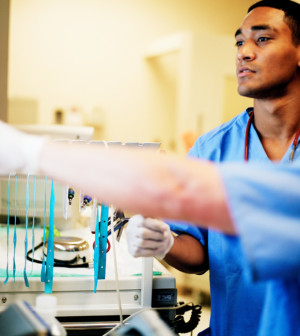- Could Your Grocery Store Meat Be Causing Recurring UTIs?
- Are You Making This Expensive Thermostat Error This Winter?
- Recognizing the Signs of Hypothyroidism
- 10 Strategies to Overcome Insomnia
- Could Artificial Sweeteners Be Aging the Brain Faster?
- Techniques for Soothing Your Nervous System
- Does the Water in Your House Smell Funny? Here’s Why
- Can a Daily Dose of Apple Cider Vinegar Actually Aid Weight Loss?
- 6 Health Beverages That Can Actually Spike Your Blood Sugar
- Treatment Options for Social Anxiety Disorder
1 in 3 Hospitals in Developing World Lack Running Water

Clean running water is essential for hospital sanitation, but a new report finds a third of hospitals in the developing world don’t have it.
“Running water is something we so take for granted and it doesn’t exist in a third of hospitals in these countries,” said study co-leader Dr. Adam Kushner, adjunct professor at Johns Hopkins Bloomberg School of Public Health, in Baltimore.
He said some hospitals try to find a way around the problem, but hazards remain.
“Some hospitals truck in water or collect it in rain barrels, with no guarantee of its cleanliness,” Kushner said. “Without clean water, there is no way to clean surgeons’ hands or instruments, wash gowns and sheets or clean wounds to prevent or reduce infections.”
His team examined 19 studies published between 2009 and 2015. The studies included data on water availability in 430 hospitals in 19 low- and middle-income nations.
In all, 147 (34 percent) of the hospitals did not have continuous running water, with rates varying country to country. For example, less than 20 percent of hospitals in Liberia had proper water facilities, while more than 90 percent had them in Bangladesh and Ghana.
“In order to provide basic health care, you need a functioning system and running water is part of that,” Kushner said in a school news release. This widespread issue “shows the deficiencies in the health systems in general in those countries,” he said.
In many developing nations, large numbers of people can’t get needed surgery, and lack of water makes that problem even worse, the researchers said.
“Hopefully, people aren’t operating [without water], but what do you do if a woman shows up in obstructed labor and needs an emergency C-section and it’s the dry season and the rain barrel is empty?” Kushner said. “You can’t operate with dirty instruments, but if you don’t she’s going to die. This is the sort of dilemma that surgeons in these hospitals face.”
The findings were published online recently in the Journal of Surgical Research.
More information
The American College of Surgeons offers surgery resources for patients.
Source: HealthDay
Copyright © 2026 HealthDay. All rights reserved.










